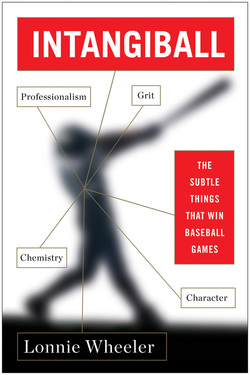
“Like garlic, they stir into the sauce,” he writes. “Like yeast, they bake into the loaf.”
And like a talented cook, Wheeler gives baseball lovers a delicious feast. “Intangiball: The Subtle Things That Win Baseball Games” (Simon & Schuster; hardback; $26; 272 pages) is a fast-paced, entertaining look at the little things that win ballgames and produce successful teams.
It might be one of Wheeler’s best efforts, and that’s saying something about an author who has collaborated on autobiographies of Bob Gibson (“Stranger to the Game”), Hank Aaron (“I Had a Hammer”) and Mike Piazza (“Long Shot”); and also moderated the book-length dialogue between Gibson and Reggie Jackson in the fascinating “Sixty Feet, Six Inches.”
The book, Wheeler writes, is not dedicated to personal production or glory, but to “deepening the understanding of what a player truly brings to a team.” This idea of second-level statistics, Wheeler argues, shows that looking in unconventional places can reveal how one player’s actions affect those around him.
Very few baseball lovers will argue the Hall of Fame statistics Derek Jeter put up during his career with in New York, but what set the Yankees shortstop apart were plays like his flip toss to catcher Jorge Posada in the 2001 playoffs to preserve a precarious 1-0 lead. Jeter had run from shortstop to the first-base line on a long hit and was in the right spot when the throw from the outfield missed the cutoff men. His flip to Posada caught runner Jason Giambi by surprise, as the Athletics runner hadn’t even bothered to slide. But Posada’s quick tag snuffed the rally.
Wheeler calls Jeter “the prototype for the intangibles superstar.”
The Tampa Bay Rays made a surprising run to the World Series in 2008, but it was the senior clubhouse presence of Cliff Floyd — and not necessarily his big bat (11 homers and 39 RBIs in 80 games) — that proved to be a steadying influence to a young squad in need of leadership.
“It’s about doing things, large or small, that will count toward your personal credit only in the eyes of the truly informed,” Wheeler writes.
Wheeler, who covered the Reds for the Cincinnati Post, uses that team as the starting point for “Intangiball.” He tracks the Reds for five years, showing how the trades of stars like Ken Griffey Jr. and Adam Dunn actually helped the team become more successful. Players once overshadowed by the talents of Griffey and Dunn pulled together and brought winning seasons to Cincinnati and a pair of division titles in three seasons.
Wheeler cites the leadership of Joey Votto and Scott Rolen, who value team above individual achievements.
He also uses the acronym “Teamship” — toughness, execution, accountability, moxie, supportiveness, history, intensity, and passion — to define intangibles. He breaks down intangibles two ways — situational and environmental. The former intangible is about the player who hits behind the runner or the catcher who deftly frames pitches to steal strikes. Environmental is more subtle, like a teammate giving a piece of advice or a slap on the shoulder for encouragement.
In addition to the Reds, Wheeler focuses on the Braves, Orioles, Rays and Phillies as teams that succeeded through intangibles.
It’s true, however, that for a team to win the World Series, it must have talent to go with those intangibles. Good chemistry helps, but the Oakland A’s won three consecutive World Series (1972, ’73 and ’74) in a tense environment. The 1977-78 Yankees were known as “The Bronx Zoo” because of all the owner-player-manager controversies. But those Yankees won back-to-back World Series titles. Those A’s made each other better, Wheeler argues, and so did the Yankees.
“The fact is that good chemistry will never trump a club’s or player’s basic aptitude for playing ball,” Wheeler writes. “But it contributes to that capacity.”
“Intangiball” shines through with solid research and good reporting, with some storytelling thrown in for good measure. Wheeler breaks down the intangibles in an easy-to-follow format. Certainly, a team needs talent to succeed. Twenty-five Eric Hinskes are not going to bring a team the pennant, but Hinske in strategic doses, like Floyd, made a difference for a young team like the Rays in 2008. An emotional, got-your-back player like Jonny Gomes could spell the difference between winning and losing.
David Ortiz, by sheer force of will and example, was able to inspire the Red Sox and help them finally break the Curse of the Bambino in 2004.
Even an established star like Pete Rose — and for a moment, remove the gambling out of the equation — made a difference. Rose was the guy who jump-started the Big Red Machine of the 1970s, and was the steadying force behind the Phillies’ first World Series championship in 1980.
Did Rose make his teammates better by his hustling play and intensity? You bet he did. Can it be quantified by numbers? Not entirely.
The list is endless.
But Wheeler brings some fresh insight to digest in “Intangiball,” and it’s a satisfying recipe.
 RSS Feed
RSS Feed
